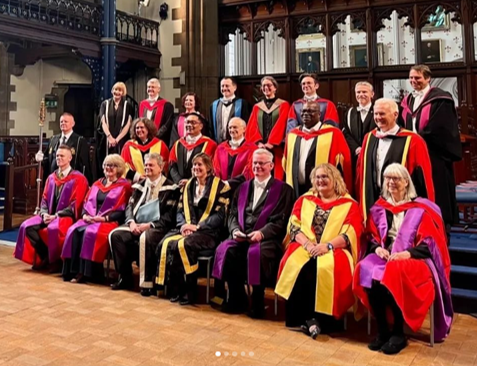Baroness Jean Coussins awarded honorary degree
Published: 30 September 2024
Baroness Jean Coussins was one of the distinguished recipients of an Honorary degree (Doctor of Letters) from the University at the 2024 Commemoration Day, which celebrates the founding of the University in 1451.
Baroness Coussins was presented at the ceremony by Head of School Professor Stephen Forcer. Baroness Coussins subsequently gave the Honorary Graduates’ response at the Commemoration Day Lunch following the ceremony. Professor Forcer’s oration, which sets out the advocacy and leadership for which Baroness Coussins has been recognised by the University, is copied herewith.
‘Chancellor, by the authority of Senate, I present to you this person on whom the Senate desires you to confer the honorary degree of Doctor of Letters, Baroness Jean Coussins.
The honorary degree recognises the lifelong contribution made by Baroness Coussins to the promotion and protection of languages not only in schools, universities and other educational settings but also in courtrooms, UN policy chambers, disaster areas, warzones and other contexts where languages play a crucial role, often between life and death.
On entering the House of Lords in 2007, Baroness Coussins noticed that there were dozens of All-party Parliamentary groups, but none for languages. As she says, however, languages cut across all government departments, whether or not policymakers realise it, and she duly established the APPG for Modern Languages.
Through the success of the APPG and many other networks, Baroness Coussins has continuously advocated for a range of language issues, from education to the rights and rescue of Afghan interpreters working with British armed forces and the role of translators and interpreters in health care. Against a real threat of hostility to languages in political and public discourse, she has brought positive advocacy, facts, and realism. She is also pushing for professional qualifications in spoken language interpreters within the UK justice system, where the right expertise can make a crucial difference to individuals and outcomes. She is President of the campaign Speak to the Future, Vice-President of the Chartered Institute of Linguists, a Patron of the Association for Language Learning, and a recipient of a British Academy President’s Medal.
Baroness Coussins is also a linguist and a determined student of languages in her own right. Having studied French, German, and Latin at School, she wanted to pick up Spanish at Cambridge University to pursue her goal of working as a UN interpreter. But Cambridge required students learning Spanish from scratch to take an oral exam two weeks into their first term. So she duly took a year out in Madrid in order to prepare. More recently Baroness Coussins has challenged herself to learn Arabic, which she has used to welcome international delegates. Indeed, she tells me that Arabic came in handy on a trip through Oman, when she was able to ask for a key to a locked bathroom. It is often said that languages and cultures open doors... Sometimes that door may be of urgent practical necessity. And on other occasions the opening is onto something life-changing. Baroness Coussins has countered the narrative of doom around languages, stressing the huge opportunities open to employers and national economies through increased engagement with languages and cultures, and the proven benefits of language learning for health and happiness.
Scotland welcomes to people seeking refuge, asylum, and new study and work experiences from abroad. And this University makes friendship and collaboration with international partners a central part of its strategy and values, with our Principal having spoken publicly of the national and international importance of languages and cultures. In that context it is a particular pleasure to recognise Baroness Coussins. For her positive minded, urgent championing and advocacy over many years, all of us working in languages and cultures in the UK owe a debt to Baroness Coussins, and to the many colleagues and bodies with whom she has worked.
Chancellor, I invite you to confer the honorary degree of Doctor of Letters on Baroness Jean Coussins.’
University of Glasgow YouTube Channel: Commemoration Day 2024 Honorary Graduates
First published: 30 September 2024
<< News


